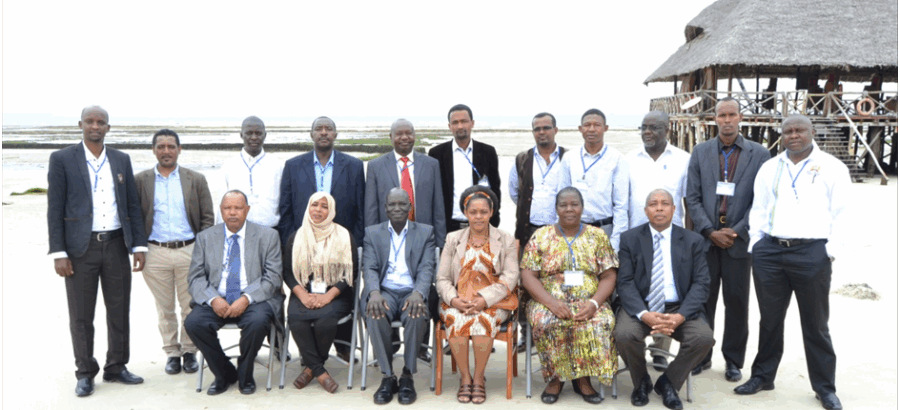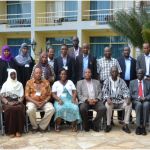A review and planning workshop was held at Dar-es-Salam from 8th to 9th February 2016. Its overall objective was to discuss consolidation of the SMP-AH activities in cross border areas for sustainability and impact. A total of 21 participants, drawn from Djibouti, Ethiopia, Kenya, South Sudan, Sudan, Tanzania, Uganda, African Union Inter-African Bureau for Animal Resources (AU-IBAR), IGAD Centre for Pastoral Areas and Livestock Development (ICPALD), attended the meeting.
In his welcome remarks Dr. James Wabacha on behalf of the Director, AU-IBAR – Prof. Ahmed Elsawalhy thanked the Government of The United Republic of Tanzania and the Ministry of Agriculture, livestock and Fisheries for accepting to host the meeting. He stated that the SMPAH Project started in September 2012 and closing by September 2016. He further emphasized that the project had attained milestones in capacity building in various areas and more importantly designed a harmonization tool –Standard Methods and Procedures (SMP) with accompanying Standard Operating procedures (SOP). He stated that it was important to review activities undertaken in 2015 and plan for those for 2016 with the main aim of creating impact on livestock keeping communities. Therefore there was need to reflect and consolidate project activities. He said that our reflection had to consider what needs to be implemented to create impact; the locations where to create impact; how to demonstrated impact; how to tell the success story; and how to undertake communication and visibility for the project.
In his opening remarks, Dr Agol Kwai on behalf of the Acting Director ICPALD, Dr Solomon Munyua, advised participating countries to maximise the benefits so far achieved by the project. He stated that it was important to adapt the validated SMPs to help streamline surveillance, enhance quarantine capacity and to continue to consolidate the capacity so far built. He advised members from the region to own the success culminating from the project and forge the way forward.
The meeting was officially opened by Dr Mtui Malamsha on behalf of Dr Hayghaimo, the Chief Veterinary Officer for Tanzania. She welcomed everybody to Tanzania for the meeting. She noted that it was important to share experience to help consolidate efforts for controlling transboundary animal diseases (TADs) in the region. She commended the SMPAH project for focussing on addressing the challenge of TADs with the view to promoting livestock trade. She noted that Tanzania had benefitted from several activities undertaken by the project, especially on laboratory inputs, training, strengthening capacity in key areas in the ministry, introduction of uniformity and harmonization in diseases control and introduction of the SMP concept in line with OIE procedures. She noted that the challenge of TADs had prevented many countries in the region to penetrate export markets. She noted Tanzania had huge livestock resources with over 50% of the households engaged in livestock production. Smallholder farms were known to catalyse growth as the supplied large numbers of consumers in urban areas with animal products. It was therefore necessary to review and consolidate gains made the project.
The meeting achieved the following outcomes:
- Documentation of progress made, challenges and lessons learned in the implementation of 2015 country activity plans;
- National/crossborder activity plans for 2016;
- Roll out action plan for laboratory SOPs;
- SMP-AH GIS mapping tool.
2.0 Proceedings
The meeting was organized on the basis of a project presentation, partners presentations country presentations, Group work assignments and plenary discussions. The following were the key topics discussed:
- Review implementation of SMP-AH activities in 2015
- Planning activities for 2016
- Review of SMP-AH Mapping tool 2016
By the close of business, countries developed action plans for 2016.
3.0 Important considerations
Considering that:
- The project has made significant gains
- The need to consolidate
- The need to create impacts in the following areas:
- Information sharing in the region
- Enhancing productivity of livestock
- Improve disease surveillance, response and control
- The need to improve the livelihoods of pastoralists
Observing that:
- There is less than a year to implement activities
The meeting agreed on the way forward mentioned below
Way forward
- Countries to undertake activities with impacts on the livelihoods of pastoralists and improve trade
- Countries to mainstream laboratory standard operating procedures (SOPs) and SOPs for epidemiological investigations into routine activities. Accordingly, countries will be supported with regional experts to guide them
- The project team to harmonize the country activity plans for 2016
- Countries to start implementing planned activities immediately
- Countries to forward to the project office data for feeding into the SMP GIS mapping tool by Friday 19th February 2016






